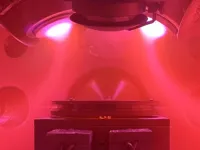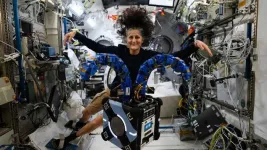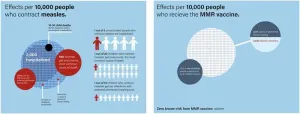(Press-News.org) Affordable and stable housing is critical to improving health across a person's lifespan. People with disabilities, including autism, comprise a significant share of people in need of housing assistance. However, the intersection of housing and health among individuals with autism is largely unknown because data on public housing and public health are not connected. Researchers from Drexel University’s A.J. Drexel Autism Institute examined how many autistic people in the United States received housing support from the Department of Housing and Urban Development (HUD) to explore their experiences and health outcomes.
“The prevalence of autism is increasing in the midst of a growing national housing crisis,” said Lindsay Shea, DrPH, director of the Policy and Analytics Center in the A.J. Drexel Autism Institute and lead author of the study. “While autism and housing have been examined separately as public health concerns, it is vital that we look into how both of these impact individuals’ experiences and health outcomes.”
In a study recently published in the scientific journal PLOS One, the Drexel research team found that the number of autistic people receiving housing support grew significantly between 2008 and 2016. Most lived in urban areas. The number of autistic individuals on Medicaid who enrolled in HUD’s housing assistance programs increased by 70% between 2008 and 2016 – from nearly 53,000 individuals, to over 88,000. In 2016, among the 846,350 autistic Medicaid enrollees, 10.4% (88,315) were HUD-assisted. Among these, 65% resided in extremely low-income households, according to HUD data.
Additionally, the research team found that HUD-assisted autistic people, by comparison to those not receiving HUD assistance, were more likely to be Black/African American and less likely to have private insurance. Approximately 2,600 autistic people (3%) were homeless when enrolling in HUD assistance.
This finding provides some of the first information known to researchers about homelessness rates among autistic people in the United States.
Researchers reviewed data from Medicaid coverage of autistic people enrolled between 2008 and 2016. They examined information on autistic people from birth through age 61 and linked it to national HUD data. This allowed them to identify disability (autism), the race and ethnicity, insurance coverage, geographic location, and health conditions of those receiving housing services.
“When these datasets are looked at together, they tell a more comprehensive story about autistic people’s experiences, highlighting the impact housing can have on health outcomes,” said Shea. “Especially as housing affordability and instability remain national policy concerns.”
Shea explained that linking Medicaid with HUD data helped them identify autistic people who are using HUD assistance. When using HUD data by itself, they are only able to see how people with disabilities, in general, use HUD assistance.
The research team also found that the number of HUD-assisted autistic individuals is increasing, and the frequency of extremely low-income families within this group, underscores growing financial hardship within this population.
“Upstream interventions to address social determinants and basic needs of autistic people who live in low-income households could help alleviate downstream housing instability and associated health concerns,” said Shea.
Shea and the research team recommend several interventions that can identify autistic individuals at risk for homelessness and reduce that risk:
Develop thorough support models and programs that connect housing, health care, financial support, transportation, and employment services for autistic people.
Improve identification and outreach to increase HUD enrollment among autistic adults who need housing support.
Create early intervention tools and increase emergency housing options to prevent homelessness and housing instability among autistic people.
Document systemic disparities and use findings to guide equitable policy design.
Address racial disparities by improving service access and reducing environmental and social stressors for Black autistic people and others from historically marginalized groups.
Enhance services and support in urban settings and ensure rural communities have equal access to housing and public health services.
Expand support for the Housing Choice Voucher program and provide resources to help autistic individuals navigate the complicated housing market.
Increase access to disability-focused programs like Section 811 and ensure long-term housing stability for autistic people.
Ensure timely and appropriate access to linked HUD-Medicaid and other data sources about communities to improve research and guide policies.
Establish systems to continuously look at autism prevalence across the lifespan and family structures and adapt housing programs according to the needs of this population.
Read the full study here: https://journals.plos.org/plosone/article?id=10.1371/journal.pone.0315008.
END
Number of autistic individuals enrolled in Medicaid and receiving federal housing support increased by 70% from 2008-16
2025-01-08
ELSE PRESS RELEASES FROM THIS DATE:
St. Jude scientists create scalable solution for analyzing single-cell data
2025-01-08
Researchers have amassed vast single-cell gene expression databases to understand how the smallest details impact human biology. However, current analysis methods struggle with the large volume of data and, as a result, produce biased and contradictory findings. Scientists at St. Jude Children’s Research Hospital created a machine-learning algorithm capable of scaling with these single-cell data repositories to deliver more accurate results. The new method was published today in Cell Genomics.
Before single-cell analysis, bulk gene expression data ...
What is the average wait time to see a neurologist?
2025-01-08
MINNEAPOLIS – Older people wait an average of just over a month to see a neurologist for specialty care after being referred by their primary care physician or another physician, according to a study published in the January 8, 2025, online issue of Neurology®, the medical journal of the American Academy of Neurology. The study, which looked at people who have Medicare insurance, also found some people wait more than three months to see a neurologist.
“Neurologists provide important and ongoing care for people ...
Proximity effect: Method allows advanced materials to gain new property
2025-01-08
UNIVERSITY PARK, Pa. — Ferroelectrics are special materials with polarized positive and negative charges — like a magnet has north and south poles — that can be reversed when external electricity is applied. The materials will remain in these reversed states until more power is applied, making them useful for data storage and wireless communication applications.
Now, turning a non-ferroelectric material into one may be possible simply by stacking it with another ferroelectric material, according to a team led by scientists from Penn State who demonstrated the phenomenon, called proximity ferroelectricity.
The ...
LJI researchers shed light on devastating blood diseases
2025-01-08
LA JOLLA, CA—Scientists at La Jolla Institute for Immunology (LJI) have discovered how a mutated gene kicks off a dangerous chain of events during blood cell production.
The study, published recently in the Proceedings of the National Academy of Sciences, reveals how a mutated gene called ASXL1 is involved in a disease called clonal hematopoiesis, a precursor to malignant diseases such as myeloid malignancies and chronic monomyelocytic leukemia.
"We know that many diseases—and all cancers—are driven by mutations in the genome," says LJI Instructor Zhen Dong, ...
ISS National Lab announces up to $650,000 in funding for technology advancement in low Earth orbit
2025-01-08
KENNEDY SPACE CENTER (FL), January 7, 2025 – The International Space Station (ISSInternational Space Station) National Laboratory is soliciting flight concepts for technology advancement that utilizes the space-based environment of the orbiting laboratory. This solicitation, “Technology Advancement and Applied Research Leveraging the ISS National Lab,” is open to a broad range of technology areas, including chemical and material synthesis in space, translational medicine, in-space edge computing, and in-space servicing, assembly, and manufacturing. It also encompasses the application of space station remote sensing data to improve geospatial analytics ...
Scientists show how sleep deprived brain permits intrusive thoughts
2025-01-08
A new study has shown that sleep deprivation can inhibit the brain’s ability to suppress unwanted memories and intrusive thoughts.
Scientists at the University of York, in collaboration with the University of East Anglia, have shown that sleep deprivation interferes with the ability of the prefrontal area of the brain to restrict the retrieval of memories that would have otherwise been suppressed.
Dr Scott Cairney from the University of York said: “Memories of unpleasant experiences often intrude into our conscious ...
UC Irvine-led team discovers potential new therapeutic targets for Huntington’s disease
2025-01-08
Irvine, Calif., Jan. 8, 2025 — A University of California, Irvine-led research team has discovered intricate molecular mechanisms driving the RNA processing defects that lead to Huntington’s disease and link HD with other neurodegenerative disorders such as amyotrophic lateral sclerosis, frontotemporal lobar dementia and Alzheimer’s disease.
The findings may pave the way for neurodegenerative disorder researchers to collaborate and share therapeutic strategies across diseases, opening additional avenues for treatment.
While it’s known that HD is caused by an abnormal ...
Paul “Bear” Bryant Awards 2024 Coach of the Year finalists named
2025-01-08
HOUSTON, January 8, 2025 — Eight active college football coaches make up the American Heart Association’s 2024 Paul “Bear” Bryant Coach of the Year Award finalist list. The award is given each January to a college football coach for contributions that make the sport better for athletes and fans alike by demonstrating grit, integrity and a winning approach to coaching and life – both on and off the field. The Paul “Bear” Bryant Coach of the Year Award is the only college football coaching honor ...
Countering the next phase of antivaccine activism
2025-01-08
In a recent essay, pediatrician-scientist Peter Hotez proposes a focus on local data, improved benefit-risk communications, actively countering health disinformation, and state-level action to address antivaccine sentiment in the U.S.
Anti-vaccine sentiment isn’t going away any time soon. In a new opinion article published January 8 in the open-access journal PLOS Global Public Health, Prof. Peter Hotez from Baylor College of Medicine, outlines key actions to stem the momentum of anti-vaccine advocates in the U.S. over the next five years.
Anti-vaccine activities in the U.S. transformed to become a politically charged movement ...
Overcoming spasticity to help paraplegics walk again
2025-01-08
Electrical stimulation of the spinal cord is a promising strategy for reestablishing walking after spinal cord injury, recent studies show. But for patients suffering from muscle spasms, the stimulation protocols have a limited effect due to the unpredictable behaviour of involuntary muscle stiffness related to spasticity. Muscle spasticity affects almost 70% of spinal cord injured patients
Now, scientists at EPFL, Università San Raffaele and Scuola Sant’Anna have found a promising way to address and reduce muscle spasticity in patients with incomplete spinal cord injury. ...




